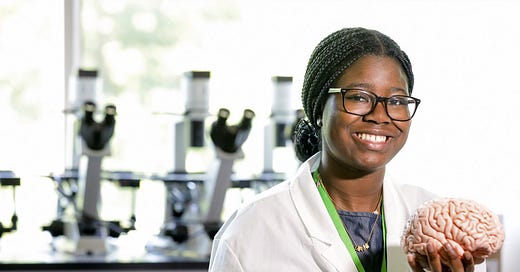The topic I’m about to discuss first came to my attention years ago as a piece of scientific news. Years after that, about two years ago, one of my Ph.D. students mentioned wanting to work on a similar topic for his thesis, bringing it back to my mind. I couldn’t recall the exact source, but I told him about it. His literature review revealed even more. Yes, that piece of news, which I hadn’t given much thought to at the time, resurfaced. But now, it was different: I am now the founder of AçıkBeyin Education Platform, which has established the largest neuroscience education network outside universities in Turkey, organizing highly detailed neuroscience courses for thousands of people. The news was indeed accurate, and I was fortunate enough to witness numerous examples of this over the past few years (for those interested, I have provided the results of a small AI-assisted literature search at the bottom).
The phenomenon is quite simple. People who receive basic neuroscience education for a certain period experience measurable improvements in aspects such as reduced depression and anxiety scores, as well as enhanced well-being, emotion regulation, and emotional stability. In other words, just "learning how the brain works" can act as a healing factor in itself. But how does this happen?
Why learning neuroscience makes us feel better?
Many of our daily mental fluctuations are actually related to the feeling of uncertainty. When we don’t know what will happen or why things are happening, we become anxious and experience various levels of negative emotions. Some of these negative feelings arise from "inside," meaning we don’t have much knowledge or foresight about why these things are happening within our minds and brains. Basic neuroscience education helps us learn the fundamental working principles of our brain, its operating mechanisms, the functions of different brain circuits, and how these affect us in our daily lives. As a result, we can experience numerous revelations even after a short period of education.
Does this information benefit, for example, medical students as well? I don’t have scientific study results on this, but from over 15 years of observation, I can say this: I have almost never seen such an effect in those who take these as mandatory technical courses. When I started teaching outside the university years later, especially in the courses under AçıkBeyin since 2019, I realized that only when people learn out of curiosity and desire, just for themselves, does that knowledge trigger the positive transformations we’ve mentioned.
In other words, we are not beings who simply store information like hard drives. No matter how useful the information is, if you don’t welcome it with curiosity, the result may not be very beneficial.
In conclusion, the AçıkBeyin courses, which we started years ago with the question "I wonder if it will work," continue to yield incredibly transformative results for me. My mentioned Ph.D. student also confirmed with a wide range of participants that learning neuroscience with love and willingness is good for you.
Not just for you, but for all of us...
PS: My Ph. D. student Fatih Bal conducted a very detailed study on a similar subject and the results are stunning. It is now being prepared for the publication, but to say the least, learning fundamental neuroscience seems more effective than EMDR treatment in this controlled study, results suggest.
FURTHER READING
If you want to know more, here is a short list of reports that I generated using Scite AI assistant:
Brick, K., Cooper, J., Mason, L., Faeflen, S., Monmia, J., & Dubinsky, J. (2021). Training-of-trainers neuroscience and mental health teacher education in liberia improves self-reported support for students. Frontiers in Human Neuroscience, 15. https://doi.org/10.3389/fnhum.2021.653069
Dubinsky, J., Guzey, S., Schwartz, M., Roehrig, G., MacNabb, C., Schmied, A., … & Cooper, J. (2019). Contributions of neuroscience knowledge to teachers and their practice. The Neuroscientist, 25(5), 394-407. https://doi.org/10.1177/1073858419835447
Fung, L., Akil, M., Widge, A., Roberts, L., & Etkin, A. (2014). Attitudes toward neuroscience education among psychiatry residents and fellows. Academic Psychiatry, 38(2), 127-134. https://doi.org/10.1007/s40596-014-0034-x
Hassan, T., Prasad, B., Meek, B., & Modirrousta, M. (2019). Attitudes of psychiatry residents in canadian universities toward neuroscience and its implication in psychiatric practice. The Canadian Journal of Psychiatry, 070674371988153. https://doi.org/10.1177/0706743719881539
Im, S., Cho, J., Dubinsky, J., & Varma, S. (2018). Taking an educational psychology course improves neuroscience literacy but does not reduce belief in neuromyths. Plos One, 13(2), e0192163. https://doi.org/10.1371/journal.pone.0192163
Miller, R. (2016). Neuroeducation: integrating brain-based psychoeducation into clinical practice. Journal of Mental Health Counseling, 38(2), 103-115. https://doi.org/10.17744/mehc.38.2.02




